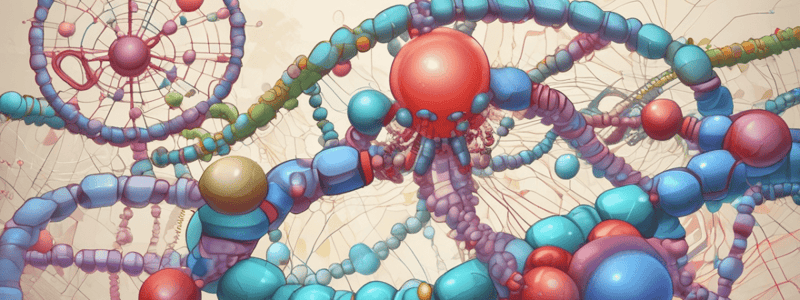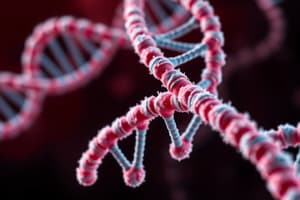Podcast
Questions and Answers
Which subunit of the E. Coli RNA polymerase binds to DNA template?
Which subunit of the E. Coli RNA polymerase binds to DNA template?
- α
- β' (correct)
- σ
- β
What is the role of σ factor in E. Coli RNA polymerase holoenzyme?
What is the role of σ factor in E. Coli RNA polymerase holoenzyme?
- Binding ribonucleoside triphosphates
- Binding DNA template
- Initiating transcription (correct)
- Assembly of the tetrameric core
How can cells regulate the amount of gene expression at the transcription initiation level?
How can cells regulate the amount of gene expression at the transcription initiation level?
- By using different σ factors (correct)
- By altering the DNA sequence itself
- By phosphorylating RNA polymerase
- By changing the nucleotide sequence in RNA molecules
What are the conserved regions in most bacterial promoters?
What are the conserved regions in most bacterial promoters?
Which gene products are classified as constitutive genes?
Which gene products are classified as constitutive genes?
What must happen to the nucleus of a skin cell before it can create an entire tadpole?
What must happen to the nucleus of a skin cell before it can create an entire tadpole?
Which molecule is needed to enhance polymerase-promoter activity?
Which molecule is needed to enhance polymerase-promoter activity?
Which option describes a mechanism bacteria use to regulate transcription?
Which option describes a mechanism bacteria use to regulate transcription?
Flashcards are hidden until you start studying
Study Notes
Gene Regulation in Cells
- Cells can change the expression of genes through gene regulation, which allows them to adapt to different environments and respond to signals.
Cloning and Gene Expression
- It is possible to clone an entire organism from an adult skin cell by injecting the nucleus into an enucleated egg.
- The resulting tadpole will develop into an adult frog.
Constitutive Genes
- Constitutive genes are essential for basic cellular functions and are continuously expressed in most cells.
- These genes encode products that perform "housekeeping" functions, such as protein synthesis (rRNA, tRNA, RNA polymerase subunits, etc.).
E.Coli RNA Polymerase Structure
- The core enzyme is composed of α2ββ'ω subunits.
- The holoenzyme is composed of α2ββ'ωσ subunits.
- The functions of each subunit are:
- α: assembly of the tetrameric core
- β: ribonucleoside triphosphate binding site
- β': DNA template binding region
- σ: initiation of transcription
Regulation of Transcription Initiation
- Regulation can occur through:
- Altering the specificity of RNA Polymerase-promoter interaction
- Impeding access of RNA Polymerase to its promoter
- Using activators to enhance polymerase-promoter activity
Inducible and Repressible Genes
- Inducible and repressible genes are regulated in response to environmental conditions.
- Examples include the alcohol dehydrogenase gene, which is induced in response to ethanol.
DNA Sequences Involved in Gene Regulation
- Bacterial promoters include conserved regions, such as the -10 region (Pribnow box) and -35 region, which interact with the σ factor of RNA polymerase.
- Some promoters also include an upstream element, which interacts with the α subunit of RNA polymerase.
Mechanisms of Transcription Regulation in Bacteria
- There are two main mechanisms to regulate transcription in bacteria:
- Using different σ factors in RNA Polymerase to recognize different classes of promoters.
- Binding of transcription factors to promoters, which can recognize specific genes and respond to environmental signals.
Studying That Suits You
Use AI to generate personalized quizzes and flashcards to suit your learning preferences.




